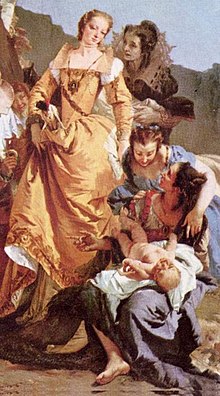Bithiah
| Bithiah | |
|---|---|
| Princess of Egypt | |

Bithiah depicted in yellow. The Finding of Moses, oil on canvas, Giovanni Battista Tiepolo, 1740, National Gallery of Scotland, Edinburgh.
|
|
| Born | Egypt |
| Spouse | Mered |
| Issue | Moses (adopted) |
| Dynasty | Nineteenth Dynasty of Egypt |
| Father | (possibly) Seti |
| Mother | (possibly) Tuya |
| Religion |
Judaism prev. Ancient Egyptian religion |
Bithiah (Hebrew: בִּתְיָה Biṯyāh, Bityá, literally "daughter of Yah") or "Daughter of God" was an Egyptian princess, and a daughter of Pharaoh according to the Old Testament. Although the name of her father is not stated in Exodus, it is specified he was a Pharaoh. Rabbinic interpretation Midrash of her Hebrew name states that since she took Moses as her son though she did not give birth to him, so does God (YAHWEH) adopts her as his daughter, naming her Bat (Daughter of) Yah (short for YAHWEH). The Bible and Midrash both assert that she was the foster mother of Moses, having drawn him from the Nile and bestowed upon him his name, which in Hebrew meant 'drawn out' (Exodus 2:10).
In Jewish tradition, she was exiled by the Pharaoh for bringing Moses the Levite into the house of Pharaoh and claiming him as her own child. Bithiah left Egypt with Moses during the mass Exodus of the children of Israel. She married Mered the Judahite. Her children were Miriam, Shammai, and Ishbah (the father of Eshtemoa).
A Scottish legend tells about a daughter of Pharaoh named Scotta, who refused to persecute the Israelites and was banished at the time of the Exodus. She was married to a Greek prince and they settled in Scotland. Their son founded Ireland.
In the Biblical account, the daughter of Pharaoh who rescued Moses is not named. A daughter of Pharaoh named Bithiah is mentioned in I Chronicles 4:18. The Midrash identifies the two as the same person, and says she received her name, literally "daughter of Yah" (Yah being a form of YHWH, which is often rendered in English as "LORD"), because of her compassion and pity in saving the infant Moses. It relates (Leviticus Rabbah 1:3) how God said He will take her in and call her YHWH's daughter (which is what “Bithiah“ means) because she took in a child not her own, and called him her son ("Moses" is thought to be derived from "child" in Egyptian).
...
Wikipedia
